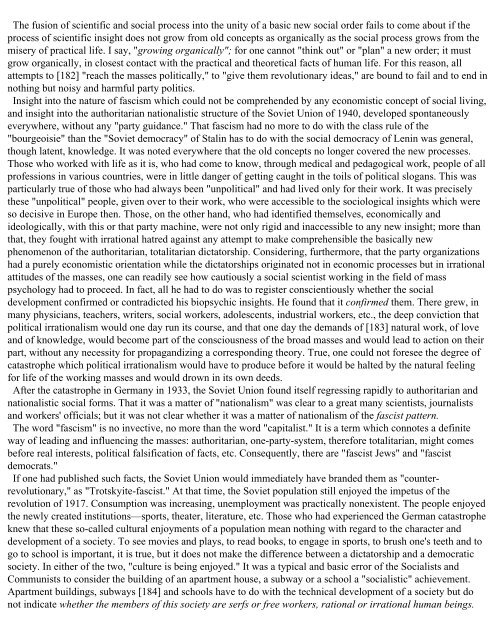The Mass Psychology of Fascism - Anxiety Depression Self-Help
The Mass Psychology of Fascism - Anxiety Depression Self-Help
The Mass Psychology of Fascism - Anxiety Depression Self-Help
You also want an ePaper? Increase the reach of your titles
YUMPU automatically turns print PDFs into web optimized ePapers that Google loves.
<strong>The</strong> fusion <strong>of</strong> scientific and social process into the unity <strong>of</strong> a basic new social order fails to come about if the<br />
process <strong>of</strong> scientific insight does not grow from old concepts as organically as the social process grows from the<br />
misery <strong>of</strong> practical life. I say, "growing organically"; for one cannot "think out" or "plan" a new order; it must<br />
grow organically, in closest contact with the practical and theoretical facts <strong>of</strong> human life. For this reason, all<br />
attempts to [182] "reach the masses politically," to "give them revolutionary ideas," are bound to fail and to end in<br />
nothing but noisy and harmful party politics.<br />
Insight into the nature <strong>of</strong> fascism which could not be comprehended by any economistic concept <strong>of</strong> social living,<br />
and insight into the authoritarian nationalistic structure <strong>of</strong> the Soviet Union <strong>of</strong> 1940, developed spontaneously<br />
everywhere, without any "party guidance." That fascism had no more to do with the class rule <strong>of</strong> the<br />
"bourgeoisie" than the "Soviet democracy" <strong>of</strong> Stalin has to do with the social democracy <strong>of</strong> Lenin was general,<br />
though latent, knowledge. It was noted everywhere that the old concepts no longer covered the new processes.<br />
Those who worked with life as it is, who had come to know, through medical and pedagogical work, people <strong>of</strong> all<br />
pr<strong>of</strong>essions in various countries, were in little danger <strong>of</strong> getting caught in the toils <strong>of</strong> political slogans. This was<br />
particularly true <strong>of</strong> those who had always been "unpolitical" and had lived only for their work. It was precisely<br />
these "unpolitical" people, given over to their work, who were accessible to the sociological insights which were<br />
so decisive in Europe then. Those, on the other hand, who had identified themselves, economically and<br />
ideologically, with this or that party machine, were not only rigid and inaccessible to any new insight; more than<br />
that, they fought with irrational hatred against any attempt to make comprehensible the basically new<br />
phenomenon <strong>of</strong> the authoritarian, totalitarian dictatorship. Considering, furthermore, that the party organizations<br />
had a purely economistic orientation while the dictatorships originated not in economic processes but in irrational<br />
attitudes <strong>of</strong> the masses, one can readily see how cautiously a social scientist working in the field <strong>of</strong> mass<br />
psychology had to proceed. In fact, all he had to do was to register conscientiously whether the social<br />
development confirmed or contradicted his biopsychic insights. He found that it confirmed them. <strong>The</strong>re grew, in<br />
many physicians, teachers, writers, social workers, adolescents, industrial workers, etc., the deep conviction that<br />
political irrationalism would one day run its course, and that one day the demands <strong>of</strong> [183] natural work, <strong>of</strong> love<br />
and <strong>of</strong> knowledge, would become part <strong>of</strong> the consciousness <strong>of</strong> the broad masses and would lead to action on their<br />
part, without any necessity for propagandizing a corresponding theory. True, one could not foresee the degree <strong>of</strong><br />
catastrophe which political irrationalism would have to produce before it would be halted by the natural feeling<br />
for life <strong>of</strong> the working masses and would drown in its own deeds.<br />
After the catastrophe in Germany in 1933, the Soviet Union found itself regressing rapidly to authoritarian and<br />
nationalistic social forms. That it was a matter <strong>of</strong> "nationalism" was clear to a great many scientists, journalists<br />
and workers' <strong>of</strong>ficials; but it was not clear whether it was a matter <strong>of</strong> nationalism <strong>of</strong> the fascist pattern.<br />
<strong>The</strong> word "fascism" is no invective, no more than the word "capitalist." It is a term which connotes a definite<br />
way <strong>of</strong> leading and influencing the masses: authoritarian, one-party-system, therefore totalitarian, might comes<br />
before real interests, political falsification <strong>of</strong> facts, etc. Consequently, there are "fascist Jews" and "fascist<br />
democrats."<br />
If one had published such facts, the Soviet Union would immediately have branded them as "counterrevolutionary,"<br />
as "Trotskyite-fascist." At that time, the Soviet population still enjoyed the impetus <strong>of</strong> the<br />
revolution <strong>of</strong> 1917. Consumption was increasing, unemployment was practically nonexistent. <strong>The</strong> people enjoyed<br />
the newly created institutions—sports, theater, literature, etc. Those who had experienced the German catastrophe<br />
knew that these so-called cultural enjoyments <strong>of</strong> a population mean nothing with regard to the character and<br />
development <strong>of</strong> a society. To see movies and plays, to read books, to engage in sports, to brush one's teeth and to<br />
go to school is important, it is true, but it does not make the difference between a dictatorship and a democratic<br />
society. In either <strong>of</strong> the two, "culture is being enjoyed." It was a typical and basic error <strong>of</strong> the Socialists and<br />
Communists to consider the building <strong>of</strong> an apartment house, a subway or a school a "socialistic" achievement.<br />
Apartment buildings, subways [184] and schools have to do with the technical development <strong>of</strong> a society but do<br />
not indicate whether the members <strong>of</strong> this society are serfs or free workers, rational or irrational human beings.


